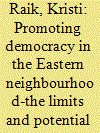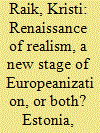|
|
|
Sort Order |
|
|
|
Items / Page
|
|
|
|
|
|
|
| Srl | Item |
| 1 |
ID:
144769


|
|
|
|
|
| Summary/Abstract |
Contrary to some expectations, the Baltic states’ accession to the EU in 2004 was not followed by an improvement in their relations with Russia. Instead, the Baltic states became known as the “troublemakers” of EU–Russia relations. This was commonly explained by their history and national identity, which contributed to an understanding of the Baltic concerns as marginal. The Ukraine crisis brought a reaction of “I told you so” by the Baltic states that for many years had been warning the West about Russia’s expansionist ambitions. This article explores the ideational underpinnings of the gap between the Baltic states’ perceptions of and relations with Russia on the one hand and mainstream views in Europe on the other. It identifies liberal interdependence, democratic peace, and realist geopolitics as key ideas that have framed the EU’s and Baltic states’ perceptions of Russia. In the vein of constructivist foreign policy analysis, these ideational structures are seen to condition the EU’s and Baltic states’ interests and policies vis-à-vis Russia. An analysis of the “Baltic factor” helps to illuminate the contradictions and shortcomings in the EU’s Russia policy and review its ideational basis which is now in need of a strategic rethink.
|
|
|
|
|
|
|
|
|
|
|
|
|
|
|
|
| 2 |
ID:
074575


|
|
|
|
|
| Publication |
2006.
|
| Summary/Abstract |
The EU aims to promote democracy in its eastern neighbouring countries through the European Neighbourhood Policy (ENP) launched in 2003. The EU has three types of neighbours in the east: Ukraine, a case of "re-transition"; Moldova, a case of prolonged transition; and Belarus, an outright authoritarian regime. As a result it needs to differentiate between stages of democratisation when designing external support. The ENP has many weaknesses as an instrument for spreading democracy, above all the fact that the conditionality policy included in the ENP is not supported by strong incentives or rewards that would encourage reforms. Some policy suggestions that could make the ENP a more effective tool of democracy promotion include systematic conditionality and an improved mechanism for supporting civil society, in particular pro-democratic groups in authoritarian countries.
|
|
|
|
|
|
|
|
|
|
|
|
|
|
|
|
| 3 |
ID:
142063


|
|
|
|
|
| Summary/Abstract |
The relationship between EU foreign policy and national foreign policies of the member states is changing due to various factors: the entry into force of the Lisbon Treaty in 2009 and subsequent creation of the European External Action Service (EEAS); the economic crisis in Europe; and shifts in the global balance of power. The article explores these new dynamics in light of two cases, Estonia and Finland. It examines why the two countries support further integration in the area of foreign policy and what determines the limits of their support, applying rationalist and constructivist approaches. From a rationalist perspective, Finland and Estonia view the EU and the EEAS as a means to pursue national interests and make diplomacy more cost-effective; these aspects have become more important due to the economic crisis and changes in the international context. At the same time both countries value the EU as a security community and a source of solidarity, which points to the importance of socialization, as conceptualized by constructivists. However, the predominance of national foreign policy identity and an instrumental approach to the EU leaves limited space for deeper socialization, in spite of the new mechanisms of socialization introduced by the EEAS.
|
|
|
|
|
|
|
|
|
|
|
|
|
|
|
|
| 4 |
ID:
164501


|
|
|
|
|
| Summary/Abstract |
The article analyses the conflict between the EU and Russia over Ukraine and other countries in the common neighbourhood as a collision between two visions of European order: the liberal norms-based order, as perceived and represented by the EU, and Russia’s pursuit of a multipolar international order where major powers are entitled to a privileged role in their adjacent regions. It makes an analytical distinction between three dimensions of the conflict: first, the norms and values of political order; second, economic order, in other words the norms regulating economic activity; and third, European security order and, more broadly, the norms of international security. There are profound disagreements between the EU and Russia along each dimension. It is misleading to call the conflict ‘geopolitical’, if geopolitics is understood in the realist spirit as a zero-sum battle over who controls the region. What is at the core of the conflict is the norms and values of European order which define inter alia Ukraine’s place in Europe.
|
|
|
|
|
|
|
|
|
|
|
|
|
|
|
|
|
|
|
|
|